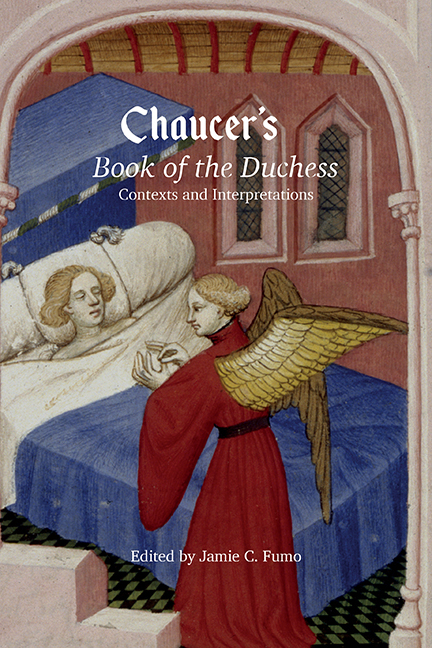Book contents
- Frontmatter
- Contents
- List of Illustrations
- Acknowledgments
- List of Contributors
- Abbreviations and Editions
- Introduction: Reopening the Book of the Duchess
- I Books and Bodies
- 1 Codicology, Text, and the Book of the Duchess
- 2 Idleness, Chess, and Tables: Recuperating Fables in Chaucer's Book of the Duchess
- 3 ‘Noon other werke’: The Work of Sleep in Chaucer's Book of the Duchess
- 4 Discovering Woe: The Translation of Affect in Chaucer's Book of the Duchess and Spenser's Daphnaïda
- II The Intertextual Duchess
- Bibliography
- Index
- Miscellaneous Endmatter
2 - Idleness, Chess, and Tables: Recuperating Fables in Chaucer's Book of the Duchess
from I - Books and Bodies
Published online by Cambridge University Press: 18 April 2018
- Frontmatter
- Contents
- List of Illustrations
- Acknowledgments
- List of Contributors
- Abbreviations and Editions
- Introduction: Reopening the Book of the Duchess
- I Books and Bodies
- 1 Codicology, Text, and the Book of the Duchess
- 2 Idleness, Chess, and Tables: Recuperating Fables in Chaucer's Book of the Duchess
- 3 ‘Noon other werke’: The Work of Sleep in Chaucer's Book of the Duchess
- 4 Discovering Woe: The Translation of Affect in Chaucer's Book of the Duchess and Spenser's Daphnaïda
- II The Intertextual Duchess
- Bibliography
- Index
- Miscellaneous Endmatter
Summary
In the proem to the Book of the Duchess, Chaucer's sleepless narrator does what no dream-vision narrator had done before: he seeks to relieve his insomnia by reading.
So whan I saw I might not slepe
Til now late this other night,
Upon my bed I sat upright
And bad oon reche me a book,
A romaunce, and he it me tok
To rede and drive the night away[.] (BD 44–9)
The narrator suggests that the stories contained in this book will be restorative, that they will bring a sense of balance back to his addled brain:
For me thoughte it better play
Then playe either at ches or tables.
And in this bok were written fables
That clerkes had in olde tyme,
And other poetes, put in rime
To rede and for to be in minde,
While men loved the lawe of kinde.
This bok ne spak but of such thinges,
Of quenes lives, and of kinges,
And many other thinges smale. (50–9)
The book, the narrator reveals, will not simply ‘drive the night away’ but will put him ‘in minde’ of a time when ‘men loved the lawe of kinde’. The particular appeal of such a golden-age vision of peace and accord can be found in the narrator's account of his sleeplessness. At the outset of the proem (1–27) the narrator complains of his ongoing torment, a cycle of despair that combines disorientation and exhaustion with a frenetic listlessness:
I have gret wonder, be this lyght,
How that I lyve, for day ne nyght
I may nat slepe wel nygh noght;
I have so many an ydel thought
Purely for defaute of slep
That, by my trouthe, I take no kep
Of nothing, how hyt cometh or gooth,
Ne me nys nothyng leef nor looth. (1–8; emphasis mine)
Chaucer's use of ydel here plays on the several connotations of the word current in the late fourteenth century. The narrator's thoughts are ‘empty’ or ‘void’ (OED s.v. ‘idle’ [adj.] A.1; MED s.v. ‘idel’ [adj.] 2a): they are closely associated with nothingness or absence (repeated three times in 11 lines; four times if we include ‘noght’ in line three); the idle thoughts furthermore lead to his ‘felynge in nothyng’ (11).
- Type
- Chapter
- Information
- Chaucer's Book of the Duchess , pp. 29 - 50Publisher: Boydell & BrewerPrint publication year: 2018

